Departmental news
University of Warwick hits the ‘gold standard’ in government teaching rankings
The University of Warwick's teaching has been rated ‘outstanding’ by the UK Government's Teaching Excellence Framework (TEF).
The University achieved the highest possible rating across all three categories for student experience, student outcomes, and for the overall assessment.
Out of 228 universities which took part in the TEF, Warwick was one of 26 to achieve the gold standard across all three. Warwick was one of only four Russell Group universities - including Oxford, Cambridge and Exeter - to achieve this.
It is the latest in a series of top ratings the University has been awarded over recent weeks.
The expert panel concluded that most student experience and student outcomes were of “outstanding quality”, including for students from under-represented backgrounds.
TEF is a national scheme run by the Office for Students (OfS) which aims to encourage higher education providers to deliver excellence in the areas that students care about the most: teaching, learning and achieving positive outcomes from their studies.
The ratings provide students and parents with an independent assessment of the quality of the education delivered by universities within these key areas.
The University has also demonstrated strong progress in closing the attainment gaps for students from disadvantaged backgrounds including those who might have not considered university an option for them in the past. Data from TEF showed better outcomes for students at Warwick from neighbourhoods where less people attend university, and those studying part-time, compared to similar groups of students at other universities.
Commenting on Warwick’s results, Stuart Croft, Warwick’s Vice-Chancellor and President said: “This is an outstanding achievement which recognises the fundamental quality of a Warwick education.
“We’re incredibly proud to have been ranked gold across both the experience students have whilst at Warwick, as well as their outcomes once they have left university.
“These results, which place Warwick as one a handful of institutions to achieve full gold rankings, is a phenomenal achievement for the people responsible – our innovative and remarkable staff and students.”
Professor Gill Cooke, WMG’s Pro Dean (Education) said: “TEF gold standard confirms the commitment and dedication to the student experience from my colleagues in WMG, and it is a delight to have our achievements recognised.”
Warwick was also recently rated as a Top 10 university in the UK by The Guardian, The Daily Mail and The Times. The National Student Survey meanwhile found that 82% of students at Warwick said they would recommend their University to future students.
University of Warwick scientists create virtual marmite for World Marmite Day – with ground-breaking potential for Alzheimer’s diagnosis
Scientists at WMG at the University of Warwick have produced virtual flavours of marmite and vegemite from scratch, using technology that can replicate the flavour of almost any food or drink and is being used in a new taste test to help with early Alzheimer’s diagnosis.
WMG’s Professor of Visualisation, Alan Chalmers has created the virtual flavours for World Marmite Day (28th September) and can, through taking samples of a food and analysing it, accurately simulate a real flavour by extracting its tastes, aromas, and mouthfeel.
The analysis is done by New-Food Innovation, a high-tech food company. Once analysed the virtual flavours are created to accurately match the real flavour using UK Food Standards Agency approved food-safe chemicals.
The analyses/ investigations are all part of Professor Chalmers’ research, together with West Midlands company Superlunary Labs, into how people perceive taste and smell.
He is also investigating whether a poor performance on the new ‘taste test’ that he has developed, may be an early warning signs for diseases including dementia. This could lead to a much earlier diagnosis of diseases such as Alzheimer’s Disease, well before any memory loss starts to occur.
Professor Chalmers describes the flavour making process as the same as using a recipe – by accurately simulating the different components of a flavour, food such as marmite can be replicated with a taste indistinguishable from the real thing.
He commented: “We recreated the health drink rooibos tea and even the chief taster of a rooibos manufacturer in South Africa could not distinguish between the real and virtual rooibos.
“I first thought of creating the samples of marmite and vegemite for a bit of fun during the Ashes cricket tests this summer as people kept asking - what is the difference between them?
“It goes back to the serious work we’re doing which shows that people’s taste and smell can give us clues what’s going on in a person’s brain years before symptoms such as memory loss start”.
Malcolm Barnes from Superlunary Labs added: “We work alongside Professor Chalmers to ensure virtual flavours are delivered from an easy to use, hygienic and highly calibrated device for Chalmers’ team to analyse.’
The full paper on the technology behind this process can be found here.
Read more about WMG’s Visualisation research here: Visualisation (warwick.ac.uk)
WMG welcomes delegation from the Indian Mission on Design and Advanced Technologies to the United Kingdom
On Wednesday (20th September) Professor Robin Clark, Dean of WMG, was pleased to welcome guests from the Indian Mission on Design and Advanced Technologies to the United Kingdom. The visit had been arranged through the Confederation of Indian Industry (CII).
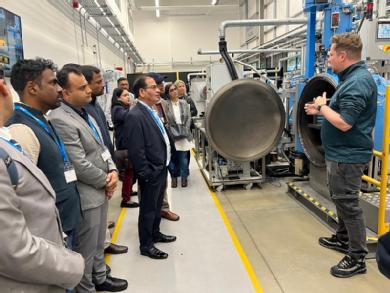 The delegation was made up of representatives from the Department for Business and Trade, and a number of companies including Tata Steel; Dynamatic Technologies Limited; Metrochem Metal Powers; DRDO; Norton Motorcycles; TVS Motor UK; Maruti; Bucket Design; Carborundum Universal Ltd; Two Design; Godrej Consumer Products, Ghaison Bikes plus attendees from IIT Roorkee.
The delegation was made up of representatives from the Department for Business and Trade, and a number of companies including Tata Steel; Dynamatic Technologies Limited; Metrochem Metal Powers; DRDO; Norton Motorcycles; TVS Motor UK; Maruti; Bucket Design; Carborundum Universal Ltd; Two Design; Godrej Consumer Products, Ghaison Bikes plus attendees from IIT Roorkee.
The guests were particularly keen to hear more about WMG’s research and education programmes and partnerships, with a clear focus on skills – including upskilling and reskilling.
Introductions were made from Dr Debashish Bhattacharjee, Vice President, Technology and R&D Tata and Chairman, CII National Task Force on Advanced Materials; and Udayant Malhoutra, CEO and Managing Director Dynamic Technologies Ltd and Chairman, CII National Task Force on Advanced Materials.
Mikhil Gandhi, Business Development Manager for Advanced Manufacturing at the West Midlands Growth Company then explained more about how and why the region has already attracted some of India’s biggest companies; before Professor Robin Clark, Dean of WMG, provided the guests with an insight into WMG’s key strengths, and opportunities for further collaboration.
Finally the guests were shown the Energy Innovation Centre (EIC) the home of WMG’s battery research, before Professor Claire Davis led a tour of the Advanced Steels Research Centre.
Professor Robin Clark, Dean of WMG, explained: “It was a pleasure to welcome representatives from the Indian Mission on Design and Advanced Technologies to the United Kingdom to WMG. Our relationship with India is long standing, and one that we value very highly.”
Read more about the CII’s initiatives here: https://www.cii.in/
The University of Warwick celebrates 200 engineering internships in manufacturing to mark National Manufacturing Day
The University of Warwick is celebrating a new milestone for its engineering internship scheme, with over 200 internships now completed.
The milestone will be celebrated at a special event tomorrow on campus to mark the UK’s National Manufacturing Day – Thursday 28th September.
The internship scheme, which was established by the University’s WMG in 2013, places students in engineering internships at manufacturing businesses across the Midlands.
The scheme has been a hit with both students and businesses, with 75% of businesses experiencing increases in productivity and 95% saying they had noticed a positive cultural change thanks to the interns.
Most businesses who hired one intern through the scheme returned in the future, with around 70 interns now having been offered full time positions as a result of their internships.
The scheme was established to address the skills gap, with businesses needing more engineers than are available. Research suggests this gap is likely to get worse as demand increases, particularly for ‘green’ engineering roles.
Febry Wardhana, an Engineering Project Management postgraduate, recently completed his internship at Midtherm Flue Systems. They were so pleased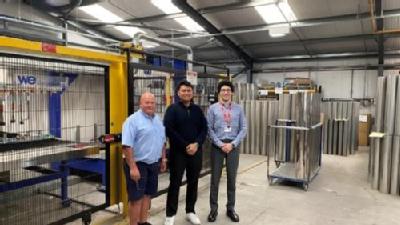 with his work Febry now works for the company permanently.
with his work Febry now works for the company permanently.
Michael Whale, Midtherm’s Training and Development Manager said: “Febry’s work has opened up a lot of new doors for us and he has done a great job, so much so that we offered him a full-time position as a process engineer.”
Other interns have gone into a range of high-profile roles in both small and large organisations. Warwick graduate Sam Woodcock who undertook an internship at Pashley Cycles is now working at Arup as a mechanical engineer. He said:
“My internship with WMG and Pashley helped me to become comfortable in not knowing the answer to every problem I faced, and therefore taught me how to persevere and overcome engineering challenges.”
Dr Mark Swift, Director of SME Engagement at WMG commented:
“Our internship programme is hugely important for us. It has supported over 200 manufacturers while tackling a range of important projects in their businesses and proves that young engineers can add real value. It is critical that we kick start the careers of our future engineers so that they can get onboard to deal with the manufacturing challenges of both today and tomorrow.”
Self-driving cars will be part of the future – but researchers fear we are leaving the disabled behind
 Self-driving cars will be part of the future, but researchers fear people with disabilities are being left behind in the development of the technology.
Self-driving cars will be part of the future, but researchers fear people with disabilities are being left behind in the development of the technology.
Over the past two decades, transportation has become more accessible, but people with disabilities still face significant barriers to accessing these services. While self-driving cars (also known as autonomous vehicles) have the potential to dramatically improve the lives of those with disabilities, helping them to travel independently, experts fear their views are being neglected in the development of the new technology
To address this, researchers from WMG at The University of Warwick and leading disability charities have considered the impact of self-driving taxis on people with disabilities, an area that has seen limited improvement over recent years.
They found that the absence of a driver was strongly correlated with feelings and perceptions of increased travel freedom, indicating that autonomous taxis could provide greater accessibility for those with disabilities – without the limitations or biases associated with their current experiences with traditional taxis and drivers.
The team also considered current issues people who have disabilities face with transport – particularly in booking taxi journeys. Participants expressed concerns about driver attitudes and behaviour as negative experiences with traditional taxis.
Lead author Shravani Sharma, PhD Researcher, WMG, University of Warwick, said: “Our research highlights the current issues those with disabilities face when booking taxis – with many reporting that their trips have been cancelled due to their use of a wheelchair. Drivers might feel the extra time wheelchairs add to journeys would reduce their earnings. While there are laws in place preventing black cab drivers cancelling journeys for those with wheelchairs – there are no such laws for other companies.
“Self-driving taxis could provide those with disabilities more freedom and reduce fear of discrimination. So, it’s crucial we listen to their opinions in developing the technology.
“We worked with charities including CASBA (Citizen Advocacy South Birmingham Area), which supports people with learning difficulties, Royal National Institute of Blind People (RNIB) and Cerebral Palsy Midlands to name a few, providing a wide range of voices and expertise. This represented many different visible and non-visible disabilities – including blindness, mobility problems, hearing loss, cerebral palsy and ADHD amongst others. The perspectives of more than 39,000 different organisation members were included.
“Alongside the current problems those with disabilities face when booking taxis, we highlighted their concerns for future, self-driving taxis. The main concern was the availability of human assistance to meet specific user needs throughout the journey.”
Examples of concerns for future, self-driving taxis:
- The challenges faced by individuals in wheelchairs when attempting to enter a car without assistance are multifaceted. Tasks include placing their wheelchair inside the car, securing themselves within it, disassembling and carefully navigating the wheelchair upon departure.
- For those with visual impairments, the struggle lies in identifying their vehicle within a crowded setting, such as a bustling railway station.
- The loss of social interactions and the light-hearted atmosphere during journeys. Many individuals with disabilities unfortunately contend with feelings of loneliness and isolation, making everyday conversations a vital source of companionship and comfort throughout their journey.
Shravani added: “It is also important that manufacturers consider the wide range of disabilities and the intricate needs for passengers – remembering that not all disabilities are visible.”
Dr Roger Woodman, Head of Human Factors, at the University of Warwick, said: “Self-driving vehicles will open up driving to people that have never been on their own in a vehicle before. It has the potential to transform their lives – with reduced reliance on others to help them get from A to B.
“Driving is a very complex task to complete, so self-driving cars could enable someone with a disability, for example, cerebral palsy or tremors, to simply press a button and go.
Ginny Cullen, CEO of CASBA, added: “CASBA exists to ensure people with learning disabilities speak up for themselves, express their views, make their choices, and are valued as citizens. We were therefore delighted to have had the opportunity to be included in this research on new autonomous vehicles to ensure driving is accessible to all.”
CASE STUDIES – both available for media interviews upon request
Jen Brown
“I have a lot of trouble with the buses. I use a walker and they don’t lower the bus, making it very hard for me to get on and off.
“I had a lot of stress with a taxi company. I often travel from Kingstanding to Northfield. The taxi company didn’t want to take the job and sometimes cancelled, leaving me stressed and late for work. Sometimes I was not able to get home from work.
“I went to a food show in November, when I got to the station the lift was out of order. I walked round the station looking for staff to help, no one and there was no one in the office. I phoned mom and dad see if they could find a number. I had to end up putting my walker on the escalator which was very dangerous.
“I nearly got locked on the train once. I have regular visits to the Severn Valley Railway and am used to the journey. When got to Snow Hill the train stopped, and I thought it was waiting for the signal. People started to get off the train, and I didn’t know why, I decided to get off and just as I did the lights went off and the doors closed. It said on the screen it was cancelled and with my hearing impairment I couldn’t hear the announcement.
Jen added her thoughts on what difference self-driving taxis would make to her life. She said: “When I finish work, I feel very tired and don’t want to talk. I just want to relax on my way home. Also, with my hearing impairment if the windows are open, I can’t hear the driver and just guess as what he is saying. Self-driving taxis would cause me less stress and worry as I wouldn’t have to worry about what the driver is saying to me.”
Michaela Mooney
“I think some people misjudge invisible disability. I may look like I can do things like everyone else but it has a high energy cost for me; my joints hurt and sometimes dislocate so when there's no seats on a bus it can be a struggle. I fall over a lot, sometimes slam doors by accident and when people don't understand what happens it can be hard mentally and physically. I think a self-driving car would mean more independence as you don't have to depend on someone to get around.”
Notes to Editors
Shravani’s research also highlights:
- This is the right time to involve many such organisations that work with people with disabilities to understand user needs via consultations, pilots, and testing.
- Presently, autonomous vehicles and other transport related studies primarily focus on addressing physical disabilities. This emphasis is evident even in signage, consistently featuring wheelchair symbols. However, the breadth of this spectrum encompasses a wide array of conditions. Consequently, it is imperative for brands to acknowledge and cater to these varied requirements and this research can be a basepoint for such engagements.
- This type of research of understanding user-specific needs and requirements will be useful for many such emerging technologies for the equitable rate of adoption to reach the overarching goal of inclusivity and accessibility.
- Future research will also consider more intelligent human machine interaction that can have a social touch to it, for example, personalised conversation nuances, or even adding diverse accents to computer generated voices.
WMG Professor made Fellow of the Royal Academy of Engineering
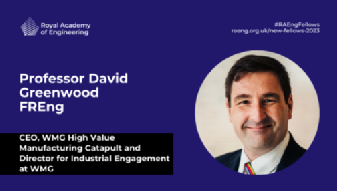 WMG at the University of Warwick’s Professor David Greenwood has been elected a Fellow of the prestigious Royal Academy of Engineering.
WMG at the University of Warwick’s Professor David Greenwood has been elected a Fellow of the prestigious Royal Academy of Engineering.
Professor Greenwood is CEO of the High Value Manufacturing Catapult and Director for Industrial Engagement at WMG.
Professor Greenwood has been elected as part of a group of 73 leading figures in the field of engineering and technology to the fellowship.
The group consists of 60 Fellows, eight International Fellows and five Honorary Fellows, each of whom has made exceptional contributions to their own sector, pioneering new innovations, leading progress in business or academia, providing high level advice to government, or promoting wider understanding of engineering and technology.
The new Fellows will be formally admitted to the Academy at a special ceremony in London on 28 November, when each Fellow will sign the roll book. In joining the Fellowship, they will lend their unique capabilities to achieving the Academy’s overarching strategic goal to harness the power of engineering to create a sustainable society and an inclusive economy for all.
Professor Greenwood commented: "I am truly honoured to be elected as a Fellow of the Royal Academy of Engineering. The UK has tremendous capability in engineering and manufacturing and the work of the Royal Academy is pivotal in helping to achieve its full potential. I look forward to playing my part in that."
Professor Sir Jim McDonald FREng FRSE, President of the Royal Academy of Engineering, said:
“Engineering is everywhere, but nowhere the same, and our new Fellows represent the great breadth and diversity of engineers who are striving to address some of the world’s most complex challenges – benefiting society and the economy in the process. From next generation power networks and water systems to quantum computing and artificial intelligence, our new Fellows are shaping the future.
“We live in an era of rapid change across our communities, our country, and of course our planet. Today we welcome to our Fellowship an inspiring group of people who are harnessing their creativity, courage and commitment to drive positive change in the world around us and we look forward to their contribution to our work.”
View the full list of 2023 fellows here.
WMG charges ahead with battery research
WMG, at the University of Warwick, has received a share of £19 million from the Faraday Institution - the UK’s flagship institute for electrochemical energy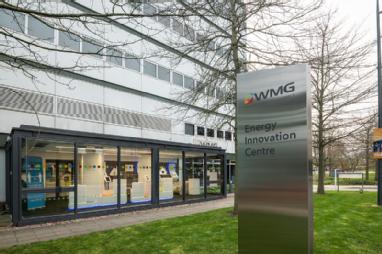 storage research.
storage research.
The funding has been allocated to four key battery research projects aimed at delivering an impact for the UK. These existing projects across three different research areas — next generation cathode materials, electrode manufacturing and sodium-ion batteries — have been reshaped to focus on the areas with the greatest potential for success.
WMG is taking a key role in two of the four, reshaped projects entitled FutureCAT and Nextrode.
WMG’s Professor of Battery Innovation, Louis Piper, will now co-lead FutureCAT, a battery cathode research project, focusing on understanding novel redox processes as a route to stabilise both high capacity, high performance, nickel rich and emerging cathodes and scalable designer morphologies. The project will build on its success in developing reliable, scalable routes to deliver a longer lifetime, high-energy/power cathodes, essential for electric vehicles.
Whereas in Nextrode, a battery electrode project, WMG is one of six university partners, led by the University of Oxford, alongside six industry partners. Researchers at WMG will investigate ways to make electrodes for Li-ion batteries unlocking the electrochemical potential.
Professor Pam Thomas, CEO, Faraday Institution, commented: “The Faraday Institution remains steadfast in its commitment to identify and invest in battery research initiatives that hold the greatest potential for making significant societal, environmental, and commercial contributions. This announcement signals the completion of our latest round of project refocusing, enabling us to allocate even more effort towards those areas of research that offer maximum potential in delivering transformative impact.”
James Gaade, Research Programme Director commented: “We are pleased that the reshaping process has bolstered the capabilities and expertise of researchers on the four projects. The realignment includes a focus around research into sustainable manufacturing methods and materials, and the need to further develop and scale up manufacture of promising materials discovered in the first three years of the projects.”
Project information
FutureCat – High nickel content, high performance cathode materialsLink opens in a new window
FutureCat, co-lead by WMG’s Professor Louis Piper, and the University of Sheffield’s Professor Serena Cussen is targeting step-changes in:
- Understanding novel redox processes as a route to stabilise both high capacity, high performance, nickel rich and emerging cathodes. The project continues its focus on doped and dual-doped lithium nickel oxides (LNO) (both polycrystalline and single crystals), including use of protective coatings. The team will also investigate the use of polyanionic cathodes, use modelling to inform the search for new candidate materials, and research designer electrolytes with the intention of stabilising the interphase layer.
- Scalable designer morphologies. The project will build on its success with doped-LNO in developing reliable, scalable routes to deliver a longer lifetime, high-energy/power cathodes through the use of gradient morphologies, co-doped cathodes (with the aim of delivering reversible discharge capacities exceeding 220 mAh/g), single crystal particles and thin coatings.
- Materials delivery: The scale up of the high nickel W-LNO material previously developed by FutureCat is being transferred to the Degradation project for testing in industry-relevant pouch cells. FutureCat will continue to investigate the manufacturing scale-up of other Ni-rich cathode materials, down-selecting promising active materials based on earth-abundant elements. Research includes the use of laser patterning to increase power densities, investigation of cracking as a failure mechanism to determine routes to resilient cathode manufacture, atomic layer deposition of coatings to improve electrode longevity, and optimisation of cycle life through the use of electrically conductive binders.
Nextrode – electrode manufacturingLink opens in a new window
Nextrode is focused on researching, understanding and quantifying the potential of smart electrode manufacturing to reduce manufacturing costs and improve the performance of batteries. Benefits could be realised in both mature material systems already used commercially and in new emerging high performance battery systems. The project is developing new practical manufacturing innovations – including traditional slurry cast electrodes and novel low or no solvent electrodes – that could deliver the benefits of smart electrodes to the industrial scale and improve sustainability of processes.
The project is researching the underpinning manufacturing science that could alleviate constraints in electrode manufacturing through engineering particle design and improved understanding of the relationship between powder properties and deposition/calendering techniques. Nextrode is designing manufacturing process steps and using advanced in-line measurements to enable slurry casting to be brought under closed-loop control. Researchers are manufacturing new arrangements of anode and cathode materials, identifying conditions where benefits are maximised and developing cells that expand the energy-power-lifetime design space.
The new phase of research projects described will progress over the two years from 1 October 2023 to 30 September 2025.
Find out more about WMG’s Electrochemical Engineering research here: Electrochemical Materials (warwick.ac.uk)
For more information on the Faraday Institution, visit www.faraday.ac.ukLink opens in a new window
WMG’s Professor Khastgir quoted in parliamentary inquiry’s call for action on self-driving vehicles
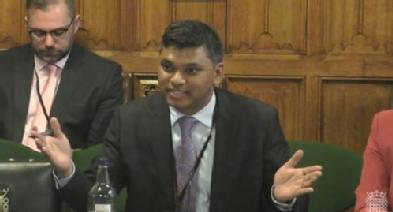 Today (Friday 15th September), the House of Commons Transport Select Committee released its cross-party report on self-driving vehicles, calling for urgent legislation to be proposed by the Government to support innovators, regulate this emerging technology sector, and give the public confidence in the safety of connected and autonomous mobility.
Today (Friday 15th September), the House of Commons Transport Select Committee released its cross-party report on self-driving vehicles, calling for urgent legislation to be proposed by the Government to support innovators, regulate this emerging technology sector, and give the public confidence in the safety of connected and autonomous mobility.
Professor Siddartha Khastgir, Head of Verification and Validation at WMG, University of Warwick, who gave evidence to the inquiry and is quoted in the report, said:
"The Transport Select Committee is right to say self-driving vehicles (SDV) are a British success story and that our domestic innovators have energy, creativity, and expertise.
"To secure this progress, we need to ensure consumers can be confident of the safety of SDVs, because, as I told the Committee we can have the safest technology, but if we cannot convince the public, they will never use it.
"So, I’m delighted the Committee is calling for the Government to ‘bring forward and pass comprehensive legislation in the next parliamentary session’ to put in place a robust regulatory framework For SDVs, and I look forward to working with industry, ministers, civil servants and parliament to ensure the public can be confident in the safety of the next generation of transport innovation."
Professor Khastgir provided written and oral evidence to the Transport Committee’s Self-Driving Vehicles Inquiry. His evidence has been referenced (significantly) in this report, including the use of the Operational Design Domain (ODD) to design driving conditions so that SDVs can be tested and operate safely; the importance of ‘informed safety’ that the technology developers need to equip the users about the capabilities and limitations of the self-driving technology so they can use the technology safely.
Read the report here: https://committees.parliament.uk/committee/153/transport-committee/news/197460/legislation-needed-to-continue-great-british-success-story-of-selfdriving-vehicles/Link opens in a new window
Bhattacharyya Award finalists “inspiring and diverse examples” of innovative and impactful partnerships between industry and universities
· Improved footballs for use in the World Cup and new technologies for defence against biological and chemical attack are examples of outcomes from six industry–academia partnerships shortlisted for this year’s annual Bhattacharyya Award
· Winning partnership will be announced at awards ceremony in Birmingham on 24 October 2023
The Royal Academy of Engineering has shortlisted six exceptional industry–academia partnerships from across the UK for this year’s Bhattacharyya Award.
The Bhattacharyya Award 2023 and a cash prize of £25,000 will be presented on 24 October 2023 to the team who best demonstrate how industry and universities can work together.
The Bhattacharyya Award is a tribute to Professor Lord Kumar Bhattacharyya KT CBE FREng FRS, the Regius Professor of Manufacturing at the University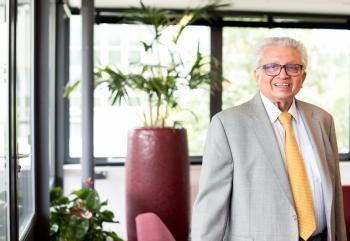 of Warwick and founder of WMG who advocated for greater collaboration between industry and universities. Funded by the Department for Science, Innovation and Technology, the annual Bhattacharyya Award is open to UK universities and colleges that have demonstrated a sustained, strategic industrial partnership that has benefitted society and is deserving of national recognition. Industry–academia partnerships from any academic discipline are eligible for the Bhattacharyya Award.
of Warwick and founder of WMG who advocated for greater collaboration between industry and universities. Funded by the Department for Science, Innovation and Technology, the annual Bhattacharyya Award is open to UK universities and colleges that have demonstrated a sustained, strategic industrial partnership that has benefitted society and is deserving of national recognition. Industry–academia partnerships from any academic discipline are eligible for the Bhattacharyya Award.
This year’s shortlist illustrates the sheer diversity of challenges that can be successfully addressed through collaboration between universities and industry, including national defence against biological and chemical attack, the supply of drinking water, nuclear decommissioning, high-speed global communications, high-performance sportswear and equipment, as well as other challenges like decarbonisation that can be tackled through the power of process systems engineering.
The full shortlist of finalists is as follows:
University of Hertfordshire and the Defence Science and Technology Laboratory (Dstl)
New technologies for defence against biological and chemical threats
The collaboration between the University of Hertfordshire and the Defence Science and Technology Laboratory (Dstl) is focused on next generation devices and systems for monitoring and identifying biological and chemical threats. The collaboration aligns with the University of Hertfordshire’s objectives to stimulate enterprise and innovation, taking a pioneering approach to the transfer of knowledge from academic research to business and government. For Dstl, the collaboration has been central to its mission to explore, sustain, grow and evaluate state-of-the-art technological capabilities to develop protective measures against hazardous biological materials.
Imperial College London, UCL and the Sargent Centre Industrial Consortium
Unleashing the power of process systems engineering research
The Sargent Centre is the world’s largest multidisciplinary research centre in Process Systems Engineering, combining a deep understanding of chemical and biochemical processes with the ability to make fundamental advances across a wide range of systems and digital technologies for the benefit of society and industry. Bringing fundamental research advances to practice is deeply embedded in the Sargent Centre’s approach. For over 30 years, Sargent Centre researchers and process industry partners (e.g., ABB, BP, Eli Lilly and Company, Petronas, Pfizer, Procter and Gamble, Siemens, Shell, Syngenta) have collaborated to address challenges in manufacturing, decarbonisation, energy efficiency, optimisation, data science, multi-scale modelling, risk and uncertainty. This has resulted in successful spin-out creation and software licensing, with tools used across the pharmaceutical, agrochemical, consumer goods, food and energy sectors.
Loughborough University and adidas
Sports equipment and clothes for improved performance, safety and inclusivity
Since 2002, the Loughborough University and adidas cross-disciplinary teams have advanced engineering knowledge that has brought iconic products to market and been translated beyond the global sports sector for wider societal impact, making sport safer, more accessible and allowing people to perform at their best whilst developing the adidas talent pipeline.
The collaborative research has influenced all adidas major tournament footballs since 2004, and the analysis of short duration collisions in football has benefited other sports including new International Standards for cricket helmet performance that have eliminated facial injuries among professional helmeted batters. Another innovation is the first-ever sweat body maps of males, females and children to inform the company’s sector-leading clima® product range. This breakthrough underpins the first virtual Human Thermal Model which enables organisations worldwide to optimise product design for multiple populations across a range of industry sectors.
University of Sheffield and the UK water sector
Keeping drinking water crystal clear
Ageing infrastructure and the complexity of interacting physical, chemical and biological processes occurring within the vast hidden water distribution systems leads to discolouration, an indicator of water quality deterioration, and the number one service contact by consumers. Over the last two decades, by combining world-leading knowledge with a fundamental understanding of the processes and delivery of practical tools and techniques, the University of Sheffield has built the ‘Prediction and management Of Discolouration in Distribution Systems’ (PODDS) consortium across the UK water sector to address these challenges. This innovative partnership has helped the sector achieve improved levels of service without increasing costs, delivering more than 35% reduction in customer contacts regarding water discolouration and increased operational efficiency through better targeting of limited resources.
UCL Optical Networks Group and worldwide telecommunications industry
High-speed ultrawideband and low-delay optical communications networks for the cloud
Optical fibre communication networks underpin global communications, carrying over 95% of all digital data. The work of the Optical Networks Group has been key to the development of this critical high-capacity, low-delay, resilient and secure communications infrastructure. By deeply embedding their industrial collaborators within the group's research, the group has achieved society-wide impact, including a 100,000-fold increase in optical network data capacity, the doubling of transmission distances, and world record data rates, using its one-of-a-kind laboratories and expertise. Since the group was founded in 1994, it has become the centre of a web of over 60 leading international industrial laboratories and companies, across all telecommunications sectors: network operators and content providers (e.g., BT, Deutsche Telecom, Microsoft, KDDI), equipment and device manufacturers (Oclaro (now Lumentum), Nokia Bell Labs, Xtera, ADVA, Mitsubishi, Infinera) and optical fibre manufacturers (Corning, OFS).
University of Manchester and Nuclear Decommissioning sector
Providing expertise for quicker, safer nuclear decommissioning
The UK has been a nuclear nation for 75 years and has accumulated one of the largest. most complex nuclear legacies on Earth. Since 2002, Government has focused on cleaning up this legacy, a programme of work that will last over 100 years and cost over £140 billion. The Dalton Nuclear Institute coordinates the UK’s most comprehensive nuclear academic community, at The University of Manchester, to deliver skilled people, impactful research and support for Government policy development. The Institute’s research has, among other beneficial impacts, led to changes in effluent treatment at Sellafield and reduced discharges to the environment by 50-90%. The team have also developed robots for high hazard settings, including one of Time Magazine’s 200 best innovations for 2022; and improved the management of the UK’s separated plutonium stockpile. In a sector with a critical shortage of experts, the Institute also provides a vital pipeline of talent.
View the videos of the shortlisted partnerships.
Professor Dame Ann Dowling OM DBE FREng FRS, former President of the Royal Academy of Engineering and Chair of the judging panel for the Bhattacharyya Award, said: “The six finalists for this year’s Award are inspiring and diverse examples of successful collaboration between academia and industry—it’s terrific to be able to highlight and to celebrate their innovation and impact and I hope they will provide inspiration for others. We know that there are other great partnerships like these between universities and colleges and industries across the UK in all sectors but that we need many more if we are to fully reap the economic and societal benefit of our research investment and capability.”
The winner of the Bhattacharyya Award will be announced on the evening of 24 October 2023 at a ceremony at the Edgbaston Park Hotel in Birmingham that will showcase the shortlisted partnerships. Anyone wishing to attend should contact awards@raeng.org.uk for more details.
Notes for editors
- WMG, University of Warwick, is a world leading research and education group, transforming organisations and driving innovation through a unique combination of collaborative research and development, and pioneering education programmes. As an international role model for successful partnerships between academia and the private and public sectors, WMG develops advancements nationally and globally, in applied science, technology and engineering, to deliver real impact to economic growth, society and the environment.
- The Royal Academy of Engineering is harnessing the power of engineering to build a sustainable society and an inclusive economy that works for everyone. In collaboration with our Fellows and partners, we’re growing talent and developing skills for the future, driving innovation and building global partnerships, and influencing policy and engaging the public. Together we’re working to tackle the greatest challenges of our age.
Media enquiries to: Pippa Cox at the Royal Academy of Engineering Tel. +44 207 766 0745; email: Pippa.Cox@raeng.org.uk
WMG and Wayve received substantial government funding to research and develop AI safety in self-driving vehicles
- WMG at the University of Warwick and leading self-driving technology developer Wayve have received £1.9 million in government funding to lead a research project on AI safety in self-driving vehicles
- This pioneering project, DriveSafeAI, aims to develop scalable methodologies and mechanisms to prove that the use of AI is safe for self-driving vehicles, which national and international self-driving vehicle developers can adapt the findings to their technology developments
- The project supports the UK government’s ambition to make the UK the leader in AI and its vision of deploying self-driving vehicles in 2025
WMG at the University of Warwick and leading self-driving vehicle technology developer Wayve have been awarded £1.9 million to undertake research to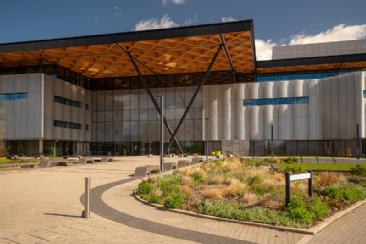 ensure the safe use of AI in self-driving vehicles.
ensure the safe use of AI in self-driving vehicles.
This project, DriveSafeAI, is taking the initiative to research and develop scalable mechanisms and methodologies to prove that AI is safe to use in self-driving vehicles. WMG is a world-class research institution with internationally recognised research capabilities in safety assurance of self-driving technologies, combined with Wavye’s expertise in developing end-to-end machine learning for self-driving, a set of evidence- and data-based methods and tools will be developed and made available for global self-driving developers to test their technologies. The research result will help shape the UK's policy and regulatory framework for AI in the future.
Self-driving vehicles can potentially bring £42 billion in economic benefits to the UK. Proving the safety of AI is a crucial step to unlocking this huge market. However, currently, there is no internationally or nationally agreed methodology in place to prove AI is safe to use in self-driving technologies, which hinders the commercialisation of self-driving vehicles. Therefore, this project will create a solution for AI safety assurance and develop societal trust in AI and self-driving technology.
More information about the DriveSafeAI project and the funding
DriveSafeAI is part of CCAV’s Commercialising CAM Supply Chain Competition (CCAMSC).
The Commercialising CAM programme is funded by the Centre for Connected and Automated Vehicles, a joint unit between the Department for Business and Trade (DBT) and the Department for Transport (DfT) and delivered in partnership with Innovate UK and Zenzic.
The £18.5m CCAMSC competition was launched in October 2022 to support the deployment of self-driving vehicles, by strengthening the capabilities of the sovereign UK CAM supply chain and is part of the Government’s vision for self-driving vehicles. Connected and automated mobility 2025: realising the benefits of self-driving vehicles.
Alex Kendall, CEO and Co-founder of Wayve, said: "At Wayve we know that confidence in our technology is crucial to commercialisation and widespread adoption of self-driving vehicles. Leveraging AI, we have the chance to bring the benefits of self-driving vehicles to everyone’s door. But first, securing trust in AI is paramount.
"That’s why we’ve been working closely with government and academia to ensure the methodologies we use to evidence safety are clear and trustworthy. Today, we’re excited to announce a formal partnership with WMG, University of Warwick, global leaders in the safety of artificial intelligence and autonomous systems. DriveSafeAI will give the public and policymakers confidence in this technology, which has the potential to revolutionise transport."
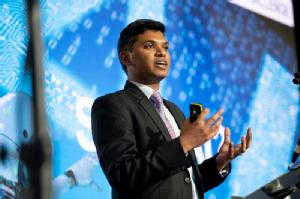 Professor Siddartha Khastgir, Head of Verification & Validation at WMG, University of Warwick, said: "AI – and particularly embodied AI – like self-driving vehicles, is one of the biggest topics currently discussed in society. Deploying this technology safely is essential to realising the huge opportunity AI can offer society.”
Professor Siddartha Khastgir, Head of Verification & Validation at WMG, University of Warwick, said: "AI – and particularly embodied AI – like self-driving vehicles, is one of the biggest topics currently discussed in society. Deploying this technology safely is essential to realising the huge opportunity AI can offer society.”
“At WMG, through DriveSafeAI we are excited to be partnering with Wayve, a leader in self-driving vehicle technology, to help shape the safe AI landscape in the UK and globally.”
“We believe the safety of this technology needs to be proven collaboratively, in a scalable manner and that future policy should have strong research foundations."
Note to editors
About Wayve
Wayve is on a mission to reimagine autonomous mobility through embodied intelligence. Founded in 2017, Wayve is made up of a global team of experts in machine learning and robotics from top organisations around the world. We were the first to deploy autonomous vehicles on public roads with end-to-end deep learning, pioneering the AI software, lean hardware, and fleet learning platform for AV2.0: a next-generation autonomous driving system that can quickly and safely adapt to new driving domains anywhere in the world.
Wayve has raised over $258M and is backed by Eclipse Ventures, D1 Capital Partners, Baillie Gifford, Moore Strategic Ventures, Balderton Capital, Virgin, and Ocado Group. The team is based in London and California, with a fleet of vehicles testing in cities across the UK. Wayve aims to be the first to deploy autonomy in 100 cities. To learn more, visit www.wayve.ai.

